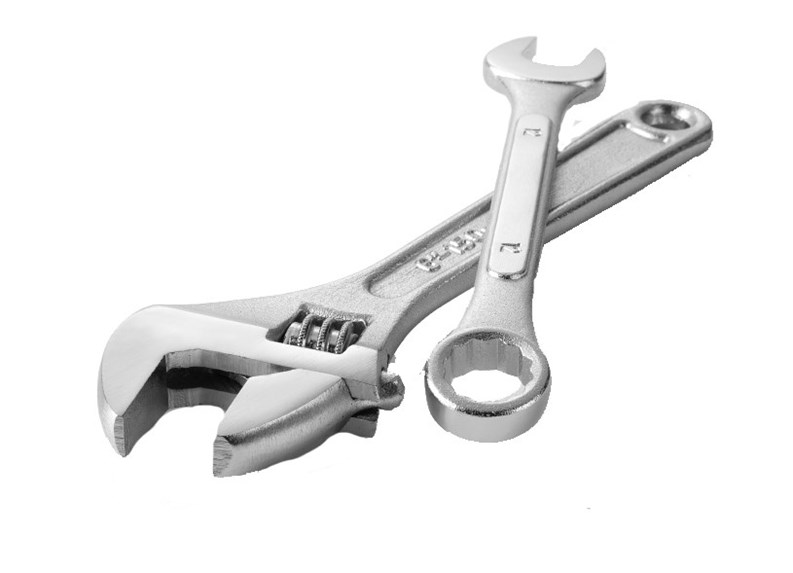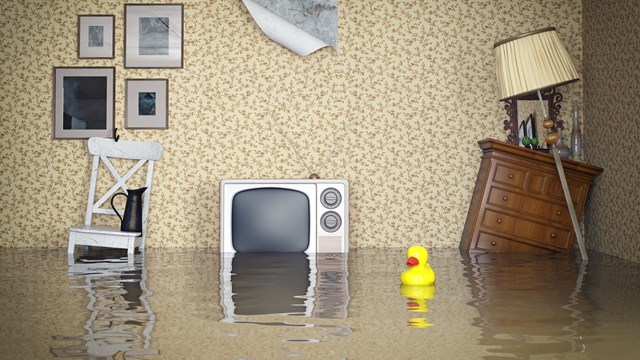We all know it's a good idea to keep tabs on the everyday supplies needed to keep our household clean and running smoothly: simple things like light bulbs, cleaning products, and perhaps, the odd spare roll of duct tape. The same is true for co-op and condo buildings, though the scale is obviously much larger and therefore a little more complicated.
While you can simply go to the hardware store or the drugstore to get cleanser and light bulbs for your living space, the quantity of supplies needed for an entire building usually require a wholesale or specialty supplier in order to be cost-effective, and a lot of thought is put into the organization of an ordering system. Who orders what? How much? What should every building have on hand, and what might be just collecting dust in the storeroom?
It's important to first understand that there are two categories of maintenance in any building: the kind that requires a professional contractor (usually anything involving major plumbing repairs, electricity, or structural issues) and the kind that doesn't (blown fuses, flooded toilets, floor waxing, and so forth). When the tenants in the unit above yours start sharing their bathwater with you via the ceiling, it's time to call a plumber.
According to Peter Grech, the president of the Superintendents Technical Association (STA) in New York, a building operations consultant, and former superintendent himself, no owner (or super) should attempt to fix such a problem on their own unless they themselves are a professional in that particular field and all parties agree to use their services.
But when you've got plants in the lobby that need watering, there's certainly no need to call a professional plant-waterer. What you do need, however, is a watering can - and where do you get one of those? A watering can for lobby plants might seem trivial, but you can imagine the annoyance that would occur if the can weren't there when you needed it. These kinds of smaller tools and supplies for little jobs are usually the responsibility of the building's superintendent.
From floor polish to thumbtacks, there are hundreds of different items that are needed to run a building. Fortunately, there are numerous businesses that specialize in stocking buildings with the supplies that maintain a building's healthy storeroom. Steve Borut is the owner and president of Borut Supply, a Brooklyn-based building supply company that replenishes all types of residential buildings in the tri-state area with a wide range of supplies, including electrical, plumbing, cleaning and janitorial products. Borut says they have "pretty much anything to keep a building clean, too - but we're not a hardware store; we specialize in building services."
In addition to the different volume of goods that need to be ordered from a supplier, there is certainly the question of what ought to be ordered in the first place. If you don't have plants in your lobby, a watering can is probably not going to make the list, but according to Borut, there isn't a building in the city of New York that shouldn't have at least one dustpan and broom - according to some sources, they ought to have a few.
"I usually suggest a building keep enough mops and buckets for each staff member," says Grech. "I give each porter their own bucket, mop and broom. That way, there are always enough to go around and the tools are better taken care of. It may seem like a lot of brooms, but if you're short, you spend more time looking for one than you do getting the work done."
As far as chemical supplies go, Grech says what one would expect: that a building needs to keep on hand the usual bleaches and soaps and floor waxing products, if applicable. What may come as a surprise to some, however, is that OSHA regulations require the building to have - permanently on file - the chemical composition of every chemical compound on the premises. Regulations state that this information should be easily accessible to the tenants and employees for a number of reasons - safety and possible liability for injury being two of the most important.
As far as machinery or heavy-duty equipment that a building should have on hand, Grech says that it depends on the building. "If you have marble floors, you'll need a buffing machine, and if you want the really high-gloss finish, you need a high speed machine, too. I do suggest a building invest in two vacuums, though - that way you've got a backup if one breaks down." Grech also points out the importance of showing employees exactly how to use any heavy equipment in the building. Mopping floors may seem pretty self-explanatory, but there are injuries that occur when any tool is used improperly, and staff members should all be instructed on the right way and the wrong way to work with any kind of cleaning tool.
Another hidden cost when it comes to supplies is the upkeep of the supplies themselves. Vacuums need bags and belts, floor waxers usually require extension cords, and now that you know you should be maintaining a chemical compound file, you may need a filing cabinet. With all these items to order, where should you start? While higher-priced items such as vacuums or halogen lamps need to be discussed before purchase, most of the stock can be ordered by the superintendent.
If an item does need special approval - such as with bulk buying - the board or board representative can grant that. "Bulk ordering makes a lot of sense in some cases," says Grech. "Take ice-melt, for example. If you've got 10 buildings, buying five or six bags for each building can get awfully expensive. It's better at that point to buy a truckload and distribute it between properties."
It's also important to remind those about to place orders to check with the board regarding various safety precautions. The high-speed floor waxer makes the floors look great, but high-gloss floors are usually high-slip, too. "That can become a safety issue," says Grech, and while "all floor waxes are not created equal," permission usually has to be granted before choices like that are made.
So once the supply list has been made and approvals have been cleared, how often should a supply order be placed? On one hand, it's not a good idea to run the risk of running out of anything.
If a superintendent doesn't have what he needs on hand, the job just won't get done. On the other hand, ordering 80 pounds of Clorox for a 10-unit building probably isn't cost-effective either, and takes up valuable space in the meantime.
One good way to keep track of the items a building needs, says Margie Russell, executive director of the New York Association of Realty Managers (NYARM) is to make a laminated, itemized list and put it up in the storeroom. When a tub of detergent is low, having a custodian or other staffer simply check the "re-order" box with a dry-erase pen can alert the super to place an order soon and the list can be used again and again.
"We also train porters, handymen, [and other staff] on Excel and other computer programs," says Russell of her organization's other offerings. "We hold classes and train them in inventory control. The responsibility at the management level is to watch prices and to have multiple suppliers, but we train at the staff level, because they are really the ones managing the actual inventory. Administrators do the ordering, check prices and select vendors, but they don't have direct contact with the goods."
And how are those vendors selected? According to Frank Pizza, supply manager for the property management arm of Insignia Douglas Elliman, "Our company serves about 250 buildings, with about 43,000 apartments. We deal in quantity, usually, which allows us to get a good price and good service, which is very important in New York City. People don't want to wait. We order from suppliers that are located only three to five miles from where I'm sitting right now. Orders placed today are delivered tomorrow or, in some cases, later today, if the order is placed early enough. That's key: if you order from suppliers that are fast, efficient and close by, you never have to keep a large inventory. The smaller the inventory, the better."
For his part, Grech says he never orders more than he needs, but does allow for delayed shipments or incorrect orders by keeping just a couple of weeks' worth of supplies on hand. The ordering process is truly different for every building, but once a month seems to be the norm.
It would be nice to have a standardized list of what a multifamily building needs - a person could just order everything from one set form - but such a thing just doesn't exist: it wouldn't be practical or realistic. Borut says his company has over 800 accounts that qualify as residential, and that every single one of them is different.
According to Pizza, "Of course, it depends on the size of the building. There are buildings and then there are buildings. We might ask a supplier to come take a look at the building and get an estimate, then form our inventory that way. Our company does a lot more public buildings than we used to, so we're ordering a lot more trash bags, paper towels, and so forth. You can usually estimate that kind of stock accurately. For private buildings, though, you have more specific needs. Plumbing supplies have to be ordered by a plumbing contractor in many cases."
"Bigger buildings certainly order more and more often," agrees Borut, and while cleaning supplies never really "go bad," they do get used constantly and need to be replenished at different rates. Borut also agrees with Grech that an order placed once a month is usually fine, but does recommend that two weeks of extra supplies are always a good idea in case a shipment is late or an item is out of stock.
Independent building supply centers specialize in this kind of trade, but it's up to a building's board or management company as to where supplies are obtained.
Oftentimes supplies are purchased like contracting services are purchased, with sealed bids from various suppliers. Grech says that yes, he orders his chemicals from a chemical supply company and arrived at that decision through a bidding process. "We talk to different companies and go with who we're more comfortable with. We usually review the standing orders we have about once a year."
While these specialty and/or bulk-wholesale companies can provide economical advantages over a smaller business, working with them certainly doesn't mean you won't be using the local hardware store. "We have accounts at local shops, too. If you need two bottles of Windex, go get two bottles of Windex at the hardware store," says Grech. "It doesn't make sense to place a special order for that. Besides, it's good to buy local."
With companies ready to ship vacuums and local hardware shops ready to sell you Windex, there is no lack of resources when it comes to stocking your building with the proper supplies for the inevitable spills, blown fuses and hallway debris. By taking a close look at your building's individual characteristics and with some planning and organization, you'll never be without that right-sized light bulb or favorite brand of wood polish again.







Leave a Comment